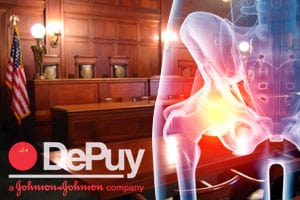
Johnson & Johnson made headlines last week over an $8.3 million verdict in the first of some nearly 11,000 cases involving allegations against its DePuy Orthopaedics unit’s ASR XL metal-on-metal hip device. Now, a second jury will be looking at the ASR’s design and making a determination about whether the ASR is, in fact, defective. […]
 Johnson & Johnson made headlines last week over an $8.3 million verdict in the first of some nearly 11,000 cases involving allegations against its DePuy Orthopaedics unit’s ASR XL metal-on-metal hip device. Now, a second jury will be looking at the ASR’s design and making a determination about whether the ASR is, in fact, defective.
Johnson & Johnson made headlines last week over an $8.3 million verdict in the first of some nearly 11,000 cases involving allegations against its DePuy Orthopaedics unit’s ASR XL metal-on-metal hip device. Now, a second jury will be looking at the ASR’s design and making a determination about whether the ASR is, in fact, defective.
A Chicago, Illinois jury is hearing opening statements in the case brought by Illinois nurse, Carol Strum, 54, who claims the DePuy ASR was not only defective, but that the company neglected to warn of the ASR’s risks, said Bloomberg News. This is the second of 10,750 lawsuits filed against Johnson & Johnson to go to trial over the DePuy ASR. Strum was implanted in 2008 with the ASR, later developing excessive chromium and cobalt levels. She underwent revision surgery in 2011 to remove and replace the ASR, said Bloomberg News. Strum seeks punitive damages.
Last week, a state court jury in Los Angeles, California, found that the ASR device was defective and caused injury to the plaintiff in that first case, Loren “Bill” Kransky, a retired Montana prison guard. Bloomberg News announced that jurors awarded Kransky $8.3 million in compensatory damages and found that DePuy appropriately warned of the ASR’s risks, said Bloomberg News. Because of that, the jury found that Johnson & Johnson did not owe punitive damages, which are typically imposed to punish a defendant. Kransky’s lawyers sought compensatory damages of $5.3 million and punitive damages upwards of $179 million, the jury’s verdict included $338,136 in medical expense damages and $8 million for physical pain and emotional suffering, said Bloomberg News, previously. Kransky, 65, alleged that the faulty design of the ASR caused his serious injuries.
Johnson & Johnson has long maintained that Mr. Kransky’s injuries had nothing to do with the now-recalled DePuy ASR device. The jury disagreed; Johnson & Johnson said it will appeal. “We believe the ASR XL was properly designed, and that DePuy’s actions concerning the product were appropriate and responsible,” said Lorie Gawreluk, a DePuy spokeswoman, in a statement. “We plan to appeal the jury’s decision on design defect,” the statement continued, said Bloomberg News last week. Analysts say the ASR lawsuits could run in the billions of dollars for Johnson & Johnson to resolve, said Bloomberg News.
Johnson & Johnson implemented a recall of 93,000 DePuy ASR devices in 2010 when the ASR’s failure rate reached 12 percent in the United Kingdom; however, since, the failure rate has been reported to be as high as 40 percent based on Australian joint registry data. Meanwhile, metal-on-metal hip implants, as a class, have become the subject of safety concerns in the orthopedic community. Since these devices were approved using the fast-tracked 510(k) approval route, clinical testing was not needed before the devices were sold to the public. Now, studies reveal that metal hip replacements tend to fail more often than other implants.
The all-metal hip implants were created for greater durability and longevity and with the intention that the seemingly stronger components would be far superior over their more traditional counterparts, which are constructed with plastic or ceramic elements. In recent years, the metal devices have come under fire for failing at unexpectedly high rates and leaving patients with significant and, often, life-long injuries. In fact, some experts say that European and American regulators worked to ensure patients were unaware of the devices’ risks and many have criticized device makers for placing profits before patient safety.
The U.S. Food and Drug Administration (FDA) also recently weighed in, issuing new guidelines to patients implanted with the ASR and other all-metal hip replacements. The agency advised, among other things, that doctors conduct physical examinations, diagnostic imaging, and metal ion testing, as needed. The agency also proposed stricter regulations that would require manufacturers to prove the implants are safe and effective before selling them. From a legal standpoint, these changes are a big step toward attempting to hold manufacturers responsible for dangers associated with their products.
“The company believes the evidence will show ASR XL was properly designed,” DePuy spokeswoman Lorie Gawreluk said in an e-mail to Bloomberg News. Meanwhile, the Los Angeles jurors did not hear evidence concerning the FDA’s review and clearance of the ASR and also did not hear evidence concerning the recall, said Bloomberg News. The Chicago jurors will hear about both the review and the recall. “The product was thoroughly and appropriately reviewed by the FDA,” Gawreluk said.


